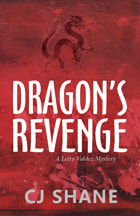
Originally posted 2018-07-22
I'm working on my second Letty Valdez mystery. The title of the new book is Dragon's Revenge. It will be published November 20, 2018.
I've been thinking about language and how fraught it is with controversy these days.
Some people seem to think that telling a falsehood is perfectly okay. If called on the lie, they double down and tell a bigger lie. As a former news reporter, I am convinced that facts matter and that telling lies can undermine everything, from personal relationships to a democracy.
On the other hand, there are those who think one should never use certain terms because those terms are not socially accepted anymore or they are not politically correct or maybe they just plain rude. These folks are willing to censor others to see their view of correct language prevail.
So what about writers who want to express a thought or words said by a character that doesn't speak in a politically-correct way.
Here's an example. In the 1960s, women were often called "girls" or if you were a hipster, you called them "chicks." So if I write a book about women in the 60s and 70s, it seems right to me to use the language of those times - girls and chicks.
Back to Dragon's Revenge: A substantial portion of this book is a memoir written in the 1970s by an old man who was a boy in the 1890s in Tucson. His stepfather was a Chinese immigrant. At that time, they called this man a "Chinaman" although that term is no longer used and is considered derogatory and offensive. In my book, he will be called a Chinaman in the memoir because that's what he was called in 1890.
Accuracy and facts are more important to me than changing definitions of what is currently "correct" or "polite."
I'm working on my second Letty Valdez mystery. The title of the new book is Dragon's Revenge. It will be published November 20, 2018.
I've been thinking about language and how fraught it is with controversy these days.
Some people seem to think that telling a falsehood is perfectly okay. If called on the lie, they double down and tell a bigger lie. As a former news reporter, I am convinced that facts matter and that telling lies can undermine everything, from personal relationships to a democracy.
On the other hand, there are those who think one should never use certain terms because those terms are not socially accepted anymore or they are not politically correct or maybe they just plain rude. These folks are willing to censor others to see their view of correct language prevail.
So what about writers who want to express a thought or words said by a character that doesn't speak in a politically-correct way.
Here's an example. In the 1960s, women were often called "girls" or if you were a hipster, you called them "chicks." So if I write a book about women in the 60s and 70s, it seems right to me to use the language of those times - girls and chicks.
Back to Dragon's Revenge: A substantial portion of this book is a memoir written in the 1970s by an old man who was a boy in the 1890s in Tucson. His stepfather was a Chinese immigrant. At that time, they called this man a "Chinaman" although that term is no longer used and is considered derogatory and offensive. In my book, he will be called a Chinaman in the memoir because that's what he was called in 1890.
Accuracy and facts are more important to me than changing definitions of what is currently "correct" or "polite."
 RSS Feed
RSS Feed